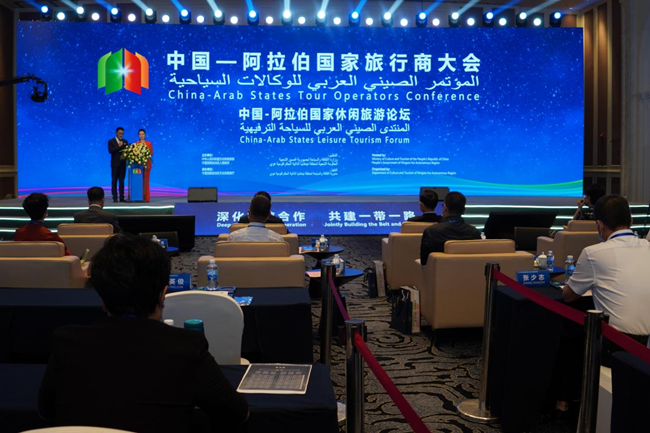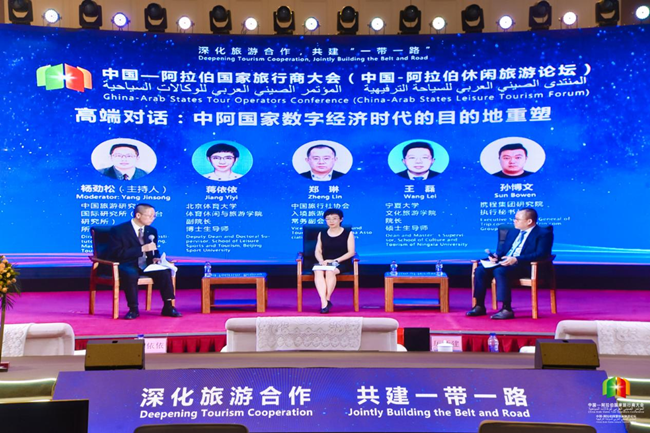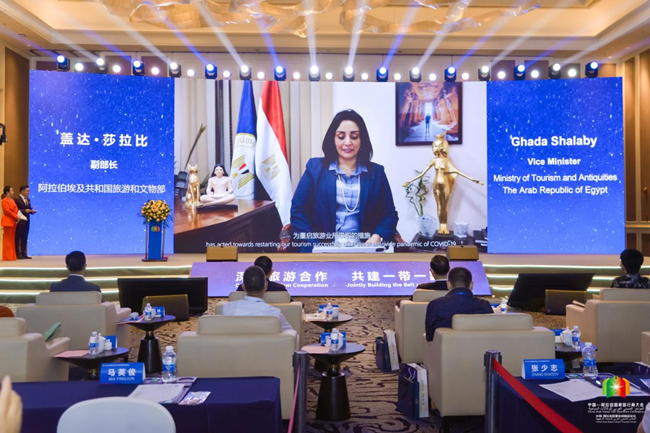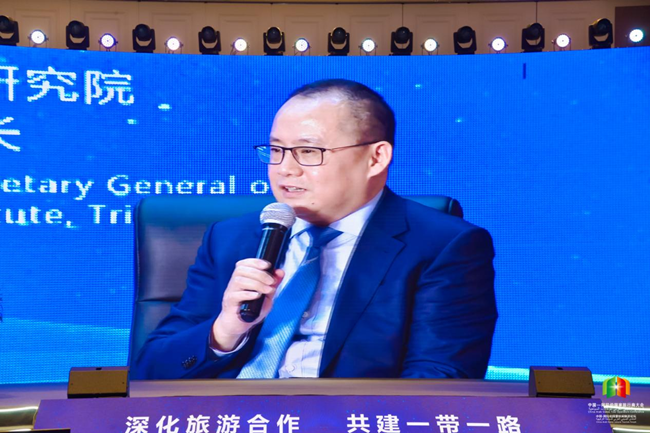
The China-Arab States Tour Operators Conference and the China-Arab States Leisure Tourism Forum are held in Yinchuan, Ningxia Hui autonomous region on August 18. [Photo/chinadaily.com.cn]
On August 18, the China-Arab States Tour Operators Conference and the China-Arab States Leisure Tourism Forum were both successfully held online and offline in Yinchuan, Ningxia Hui autonomous region.
The events convened in the main venue in Ningxia, with both being simultaneously staged in a parallel venue in Beijing.
The conference aims to build cooperative channels for the strong recovery of the global tourism industry in the post-pandemic era, achieve the shared and mutually beneficial development of domestic tourism, and provide a strong stimulus for Ningxia in the high-quality development of its tourism industry.
Zheng Lin, executive vice-chair of Inbound Tourism of China Association of Travel Services, shared the experience of China's inbound travel agencies in China-Arab tourism exchanges and cooperation in the age of the digital economy.
Zheng said that China's inbound tour operators, many of which are highly successful, have already started to apply digital technology and the Internet 20 to 30 years ago. They have used digital technology to integrate the supply chain and improve user experience, among other purposes, and have achieved excellent innovations and results through the application of digital technology.

China-Arab Thematic Forum on the Reshaping of Tourist Destinations in the Age of Digital Economy is held. [Photo/chinadaily.com.cn]
Some travel agencies have created websites dedicated to the Arabian market so as to facilitate targeted marketing, which has also achieved good results, according to Zheng.
On the Arabic channels of international online travel sites, such as TripAdvisor and Viator, there are a large number of products from inbound tour operators in China. There are also products from inbound tour operators on the Arabic channel of China's travel site Trip.com.
In China, a tour operator can use Internet technology to create a website for tour guides who can speak foreign languages, so as to facilitate transactions between users and tour guides. The website provides clear, vivid and detailed introductions to the tour guides, with videos and profiles. Among them, many Arabic tour guides are highly popular. This website solves the difficulties of tour operators and social users looking to find Arabic tour guides and interpreters.
It is a very good example of using digital technology in our industry to improve operational efficiency in the mode of "sharing economy", Zheng added.
After the pandemic, tourist destinations all over the world are facing the great challenge of destination reshaping. COVID-19 has hit the tourism industry hard, dealing a heavy blow not only to travel agencies, but also to airlines, hotels, scenic spots, and tour guides. Once the pandemic eases, people will be able to travel again, and tourist destinations all over the world will return to the battle to win tourists.
"This means great pressure for China's inbound tour operators, but we are still very confident", Zheng said.
The sources of this confidence include: China being best in the world at combating the pandemic; China's system and the respect and priority given to people's lives work to everyone's advantage.
To ensure successful post-pandemic reconstruction, China's inbound tour operators are also making active preparations. The pandemic has offered an opportunity for us to learn and upgrade. It is important for us to make efforts in upgrading products, broadening channels, and organizing training.
At this time, for the overseas market, it is particularly important to organize workshops and training, demand research, product iteration and promotion for overseas customers.
"At present, these tasks are almost invariably completed using digital technology and the Internet."
Zheng said that he hopes that in the process of the post-pandemic reconstruction of tourist destinations all over the world, China's inbound tourism can reshape market destinations by means of the Internet and digital technology, and will stand out after the pandemic.
At present, Chinese inbound tour operators can connect with source countries by means of the network, and improve their own capacity in terms of operation strategies and marketing skills regarding tourism websites, platforms and new media. This allows them to be more responsive to market demand and to improve their competitiveness in the global market.
In regards to Arab source countries, some Chinese enterprises have produced short videos from multiple perspectives and dimensions, with content in such fields as food, intangible cultural heritage, scenery, and lifestyle. These short videos are delivered to customers and users in the Arab market through different channels, so as to enhance their understanding and stimulate their interest in traveling to China once the pandemic is over.
"I hope that through our efforts, after the pandemic, the tourism cooperation between China and Arab countries will reach new heights, and that more and more people from the Arab world will come to China to travel, and hopefully, fall in love with our country", Zheng said.

Ghada Shalaby, vice-minister of Tourism and Artiquities, the Arab Republic of Egypt, attends the forum. [Photo/chinadaily.com.cn]

Zheng Lin, executive vice-chair of Inbound Tourism of China Association of Travel Services, speaks at the forum. [Photo/chinadaily.com.cn]